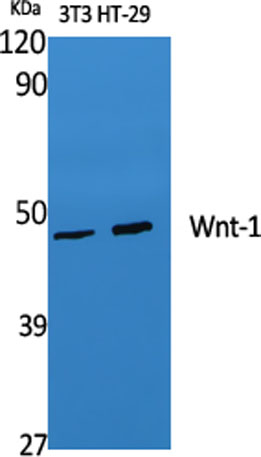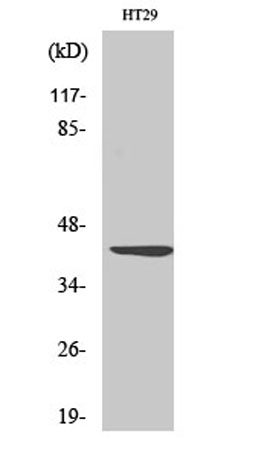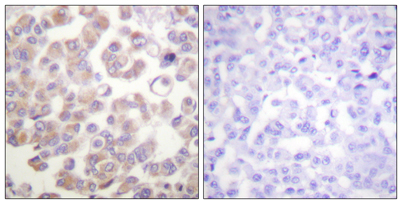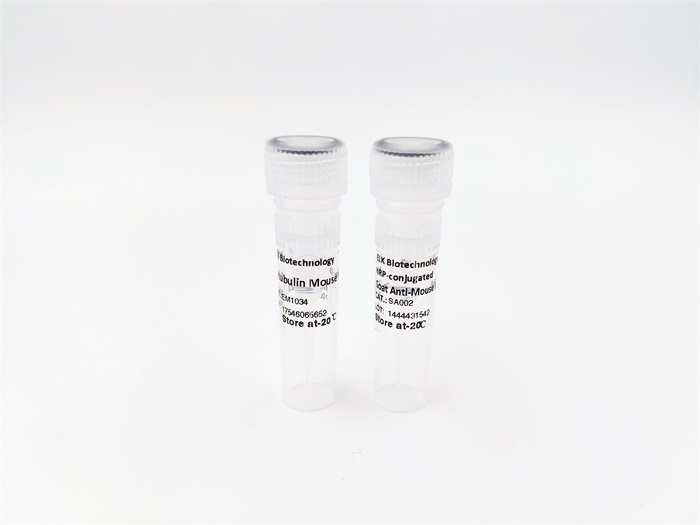








Wnt-1 rabbit pAb
 One-click to copy product information
One-click to copy product information$148.00/50µL $248.00/100µL
| 50 µL | $148.00 |
| 100 µL | $248.00 |
Overview
| Product name: | Wnt-1 rabbit pAb |
| Reactivity: | Human;Mouse |
| Alternative Names: | WNT1; INT1; Proto-oncogene Wnt-1; Proto-oncogene Int-1 homolog |
| Source: | Rabbit |
| Dilutions: | Western Blot: 1/500 - 1/2000. Immunohistochemistry: 1/100 - 1/300. Immunofluorescence: 1/200 - 1/1000. ELISA: 1/10000. Not yet tested in other applications. |
| Immunogen: | The antiserum was produced against synthesized peptide derived from human WNT1. AA range:301-350 |
| Storage: | -20°C/1 year |
| Clonality: | Polyclonal |
| Isotype: | IgG |
| Concentration: | 1 mg/ml |
| Observed Band: | 45kD |
| GeneID: | 7471 |
| Human Swiss-Prot No: | P04628 |
| Cellular localization: | Secreted, extracellular space, extracellular matrix . Secreted . |
| Background: | The WNT gene family consists of structurally related genes which encode secreted signaling proteins. These proteins have been implicated in oncogenesis and in several developmental processes, including regulation of cell fate and patterning during embryogenesis. This gene is a member of the WNT gene family. It is very conserved in evolution, and the protein encoded by this gene is known to be 98% identical to the mouse Wnt1 protein at the amino acid level. The studies in mouse indicate that the Wnt1 protein functions in the induction of the mesencephalon and cerebellum. This gene was originally considered as a candidate gene for Joubert syndrome, an autosomal recessive disorder with cerebellar hypoplasia as a leading feature. However, further studies suggested that the gene mutations might not have a significant role in Joubert syndrome. This gene is clustered with another family member, WNT10B, in |
-
 Western Blot analysis of various cells using Wnt-1 Polyclonal Antibody diluted at 1:1000. Secondary antibody(catalog#:RS0002) was diluted at 1:20000
Western Blot analysis of various cells using Wnt-1 Polyclonal Antibody diluted at 1:1000. Secondary antibody(catalog#:RS0002) was diluted at 1:20000 -
 Western Blot analysis of HT29 cells using Wnt-1 Polyclonal Antibody diluted at 1:1000. Secondary antibody(catalog#:RS0002) was diluted at 1:20000
Western Blot analysis of HT29 cells using Wnt-1 Polyclonal Antibody diluted at 1:1000. Secondary antibody(catalog#:RS0002) was diluted at 1:20000 -
 Immunohistochemistry analysis of paraffin-embedded human breast carcinoma tissue, using WNT1 Antibody. The picture on the right is blocked with the synthesized peptide.
Immunohistochemistry analysis of paraffin-embedded human breast carcinoma tissue, using WNT1 Antibody. The picture on the right is blocked with the synthesized peptide.

 Manual
Manual